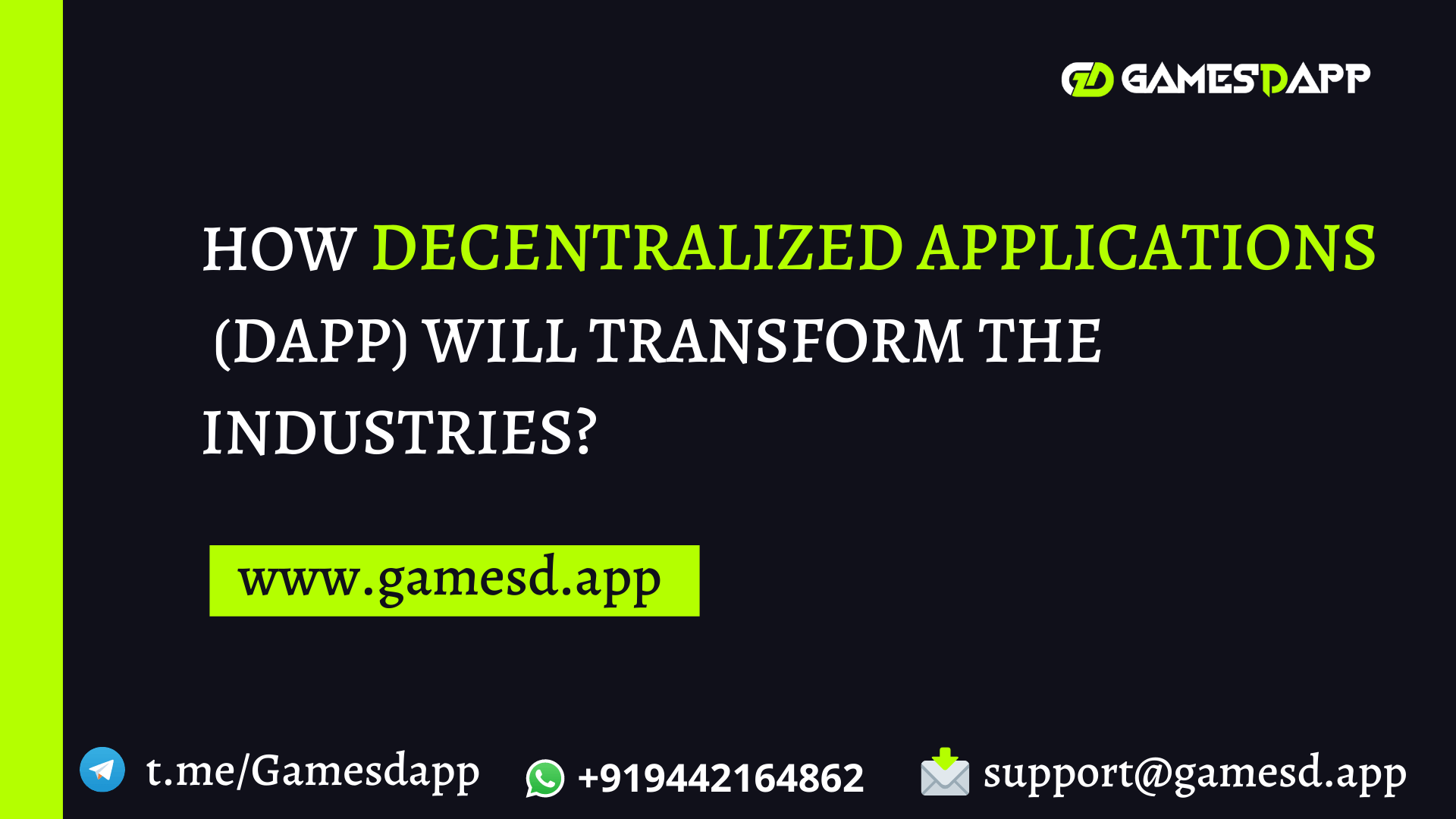The global Decentralized Application (Dapp) market is expected to rise at a considerable rate during the forecast period, 2021 to 2027. Currently the market is growing at a steady rate and with the rising adoption of strategies by key players, the market is expected to rise over the projected horizon. Thus developing a Decentralized Application is an innovative way to make your business as a brand and make it highly available to your end users.
What is Decentralized Application (DApp)?
Decentralized Applications or DApp is nothing but the Open source application that are used to interact with smart contracts and work on a P2P basis with no centralized authority in order to track and monitor the working. As the name defines decentralized system is where the power of taking decisions is not centralized. The system has abundant nodes and each node will take decisions for their own behavior. As we all know that decentralized system is more secure than centralized structure as the data is distributed in different nodes rather than a single server and also the main aspect of decentralization is that no single node has all the system data in its storage facility.
Decentralized applications doesnot need two end-users to carry out the transaction for a particular system as it consisst of an unlimited number of end users.
Why DApp Development over traditional App Development ?
First and foremost, the most noticeable and principal difference between the traditional app development and dApp development is the level by which code should be examined before it’s moved to production. The coding of dApp development requires a rigorous prototyping and testing. This code is to be written by the experienced developers and requires a lot of time and money to fix the issues.
The major reason to go for DApp Development is the smart contract integration - a DApp's backend for lack of a better term.
Smart Contract - Smart Contract is a code of an contract or an agreement built on Ethereum Blockchain and runs exactly as programmed.
A smart contract is code that lives on the Ethereum blockchain and runs exactly as programmed. They cannot be changed once they are deployed on the network. Dapps can be decentralized because they are not controlled by an individual or company rather they are controlled by the logic written into the contract.
How Decentralized Applications (dApp) Will Transform the Industries?
One of the main things that all businesses look for is innovative technologies that streamline various operations and processes to offer more convenient and greater experience to their users. Dapp is one of the impressive technologies that can help businesses to achieve the above objective.
Few Industries that gets influenced by Dapp,
- Ecommerce
- Logistics
- Supply Chain Management
- Healthcare
- Transportation
- Real Estate
- Insurance
- Finance
- Automotive and more
Ecommerce
Normally, eCommerce businesses will pay huge amounts of profits to third parties for payments and transaction validation. Since Dapps involve no payment processes, therefore the sellers dont need to pay the processing fee. This obviously adds to the cost-effectiveness and let your eCommerce businesses pass on the savings to customers by offering them with great deals.
Logistics and Supply Chain
As a Decentralized Application - DApp will streamline the operations and drive efficiency in logistics and supply chain. Trust in the logistics industry is largely affected by the lack of visibility into the in-transit shipments as well as documentary delays which increase the risks and costs in supply chains. Blockchain enables for tokenizing of the trade asset and digitally managing trade documents so that organizations are able to obtain delivery assurance and reduce supply chain risks and losses that come with document manipulation and errors.
Healthcare
The best usecase for dapp is the healthcare industry. When a patient is undergoing treatment, the details get entered in the app. dApps can connect the pieces of information in a shared network. It means that the treatment detail will be available at any time if the patient is visiting another hospital for treatment.
If there is a dApp which gets shared between various health practitioners and organizations, they can share information about the disease and its widespread. It will help in treating the disease faster. Instead of storing the health details of patients in a centralized electronic health record, they can store in a dApp which is owned and controlled by them. They can the only person to decide who can view the app.
Transportation
Using dApps in transport will ensure that all the data gets stored across all the members of the group. It will be visible to anyone, and no tampering can take place. Let us see a few uses of dApps in the transport industry.
Faster and secure payment, no cost of transaction, Better Tracking, Vehicle cost determination, New carrier Approvals, Streamlining the operation, Reliable Load Information etc,.
Real Estate
Real estate is the largest asset class in the world. Commercial enterprises and real estate professionals are recognizing the transformative impact of blockchain technology to optimize retail and commercial property sales, streamline payments, and increase access to real estate funds and investment opportunities.
- Tokenization of real estate assets
- Process efficiency for underlying industry operations
- Reduced costs from process automation
- Access to global asset distribution
- Access to broader investor pools due to ownership fractionalization
- Access to secondary market opportunities
- Data accessibility to increase transparency and inform better investment decisions and portfolio management
Insurance
Dapp technologies present potential use cases for insurers that include innovating insurance products and services for growth, increasing effectiveness in fraud detection and pricing, and reducing administrative cost.
Business Benefits of Decentralized Applications(DApp)
There are many reasons for DApps to gainpopularity. Here you can have a look at the advantages of decentralized applications and decide if they could benefit your company.
Censorship Resistance - No government or 3rd party can block users from operating a DApp. No single individual has the right to control the network, prevent users from submitting transactions, deploying the applications, or reading data from the blockchain
Anonymity - Decentralized applications will not require your real identity. Instead of going through an extensive signup process, it is required to have a Ethereum login and a digital wallet.
Zero Downtime - As it is a peer to peer system DApp will function even if the network architecture goes down.
Data Integrity - The data records stored on the blockchain are more reliable as the users can access public blockchain to verify transactions and data cannot be forged by the hackers.
Payment transaction - The users pay the cryptocurrencies in p2p network with the help of smart contract
Built-in Payments - There’s no need of third-party payment provider app, this makes for much faster payment processing times.
Confidentiality - The transferred information is should be encrypted and the information's are stored in the form of multiple blockchain copies
Trust and Audit - Each and every transaction is transparent to its users. Public blockchain ledger allows third parties and used to see the transactions
On the basis of types, the Decentralized Application (Dapp) market is primarily split into:
● Game APP
● Financial APP
● Lottery APP
● Social APP
● Transaction APP
● Other
Key Features of Decentralized Applications
Open source – Freely available and capable of modification and redistribution.
Decentralized – Hosted on a decentralized blockchain.
Distributed – Leverage complex cryptography as a verification method.
Turing complete – Given the required resources, the dApp can perform any action.
Deterministic – The same operation performed across different nodes (computers or connected devices) returns the same result.
Isolated – If the smart contract happens to have a bug, it won’t impact the normal functioning of the blockchain network.
Blockchain networks that can be used for dApp Development:
dApps are tamperproof and records stored in it are inalterable, protecting the application from hacking. These platforms are used to build dapp development
PolkaDot - Polkadot will provides a completely decentralized web where users are in control.Polkadot is built to connect private and consortium chains, public and permissionless networks, oracles, and future technologies where independent blockchains can exchange information and transactions in a trustless way via the Polkadot relay chain.
Ethereum - Ethereum is an open-source distributed platform in the blockchain network. Ethereum is called ether and is used to running in a unified ethereum ecosystem.
EOS - Eos is introduced in 2018 which is also open-source software, which is ain to generate decentralized storage for smart contract functionality and enterprise solution. EOS blockchain accomplish consensus with multi-threading and accredit proof of stake algorithm
Tron -Tron is founded in 2017 which is aim to build a distributed storage technology for the digital content system, and also allows cost-effective sharing of digital content. Tron is an aggressive initiative which has lined up lots of potential breakthrough in the years to come.
Cosmos - Cosmos is an ever-expanding ecosystem of blockchains that can scale and interoperate with each other, built for a decentralized future.
Matic - Matic Network provides scalable, secure and instant Ethereum transactions using Plasma side chains and a Proof-of-Stake network.
How to develop a Decentralized Application?
DApp Development Process
Creating a decentralized applications is quite different from other software development that goes through the following several steps,
Step 1 - Identify the Problem
Step 2 - Create a prrof of concept
Step 3 - Pick a DLT Platform
Step 4 - Develop and Test the Dapp
Step 5 - Launch your DApp
DApp Development Company
Get in touch with a leading dApp development company who understands the blockchain technology and decentralization and can help you provide the risk-free and robust solution.
We Gamesdapp as a Leading Blockchain Game Development Company will design and develop P2P Decentralized Applications for a wide range of industries, including E-commerce, transportation,healthcare, supplychain, utility, logistics and startups.Our experienced dApp developers know how to convert ideas into dApp development that can bring security and transparency to your business ecosystem.
Get A Demo
Let's Connect With Us








